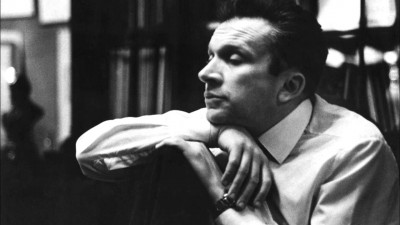
FGO announces Holocaust-themed ‘The Passenger’ for 2015-16
Next year, Florida Grand Opera will join a small company of American opera troupes to mount a work that, since its belated premiere just five years ago, has electrified the operatic world.
This week, FGO announced that one of the four operas it would present in its 2015-16 season is Mieczyslaw Weinberg’s The Passenger. Written by a Polish composer who escaped the Holocaust in 1939 by fleeing into the Soviet Union, where he stayed for the rest of his life, The Passenger was commissioned by the Bolshoi Opera House for a 1968 performance but not produced.
It received a concert performance in Moscow in 2006, 10 years after Weinberg’s death, and in 2010 it was staged for the first time at the Bregenz Festival in Austria. Since then, it has been taken up by Houston Grand Opera, the English National Opera, the Lincoln Center Festival in New York, and the Lyric Opera of Chicago, which presents it later this month.
Weinberg’s best-known advocate was his colleague Dmitri Shostakovich, who was 13 years his senior. Shostakovich routinely praised Weinberg’s work, and when Weinberg — known as Moisey Vainberg in Soviet sources — was imprisoned for “Jewish bourgeois nationalism” in 1953, during Stalin’s last paranoid months, it was Shostakovich who intervened with the much-feared head of secret police, Lavrenty Beria, to have him released.
Weinberg was quite prolific, composing 26 symphonies as well as seven operas, 17 string quartets and a host of film and theater scores, plus a Requiem, concerti and sonatas. His work has gradually come to be seen as a very important body of contemporary music, and The Passenger in particular as a masterpiece. His style is reminiscent of Shostakovich, but it tends to be more sober, with less of the impudence and determination to shock found in the older composer’s work.
The story of The Passenger, based on a 1959 radio play by Zofia Posmysz, a Polish Catholic concentration camp survivor, is fascinating and grim. A West German diplomat and his wife, Liese and Walter, are on their way to Brazil aboard ship when Liese thinks she spots a woman whose death she had presided over as an Auschwitz camp guard, a detail of her life she has never divulged to her husband.
The opera switches back and forth between the ship and her memories of Auschwitz itself — on a two-tier set with the ship on top and the concentration camp below — as Liese tries to discover if the passenger was indeed her victim who has miraculously survived.
Mieczyslaw Weinberg (1919-1996).
Susan Danis, FGO’s general director and CEO, wrote in an email to me that “the subject matter and the overall production, not to mention an amazing score,” drew her to the opera as a suitable vehicle for the company.
“It is a work that is new, satisfying those who don’t want to see the classics, accessible for those afraid of new opera, and most importantly, the subject matter is very relevant to many members of our community,” she wrote.
The rest of FGO’s upcoming season, indeed, consists of three Italian works from the bel canto period of the early 19th century: Rossini’s The Barber of Seville, Bellini’s Norma, and Donizetti’s Don Pasquale.
Florida Grand Opera will use the original Bregenz Festival production, which Danis said all of the American productions have been using. The large cast also will feature singers from earlier presentations.
“Casting is underway,” she wrote. “With such a complicated production, we will be drawing from the casts of both the Chicago and Houston productions.”
The Passenger will be presented in tandem with educational outreach, Danis wrote.
“We already have many partnerships established, including one with the FIU (Jewish Studies Initiatives program) and (the University of Miami) theater program,” she wrote. “The opera is based on a radio play from a Polish concentration camp survivor. We have secured the rights to perform the play, and the students from UM will perform scenes.
“That’s just the beginning,” she wrote. “This will be a very important event in our community for so many reasons.”
The opera has generated a great deal of discussion; in addition to substantial excerpts from the opera, there can be found online discussions such as this one from the Chicago Humanities Festival late last year (featuring the eminent Chicago cultural critic Andrew Patner, who died suddenly on Tuesday at 55). One of the common themes of these discussions is that The Passenger does not sentimentalize the Holocaust.
“The opera will be a vehicle for learning about this unthinkable event for children in our public schools. What happened cannot be forgotten, ever,” Danis wrote.
The Passenger will be presented five times in 2016: April 2, 3, 5, 8 and 9, at the Ziff Ballet Opera House in downtown Miami. For more information, visit FGO.org.
Recent Content
-
Artsarticle ·
-
Artsarticle ·
-
Artsarticle ·

